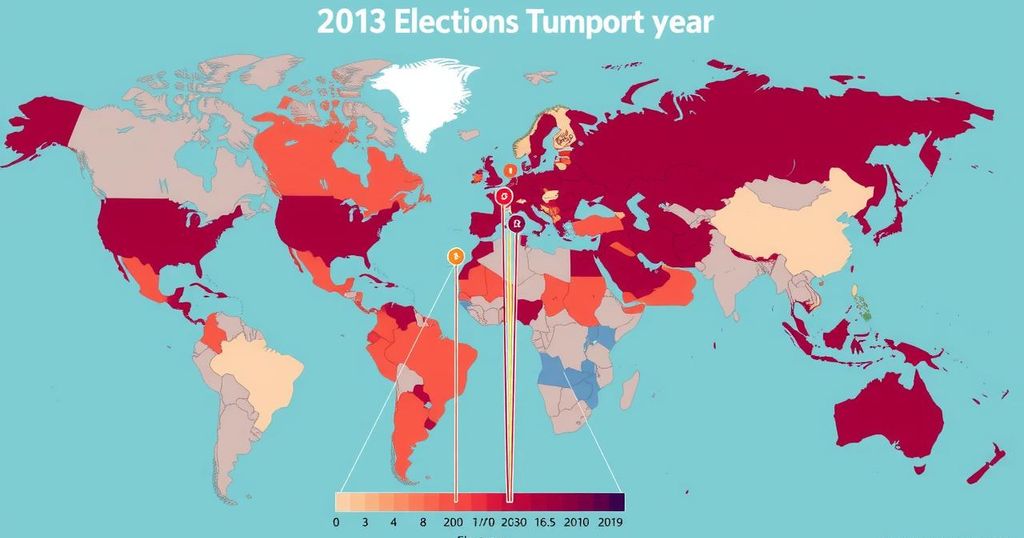2024: A Year of Political Discontent and Shifting Power Dynamics

In 2024, widespread anti-incumbent sentiment was evident as voters across 70 nations ousted sitting governments amid economic discontent and geopolitical instability. Significant electoral changes occurred in countries such as South Africa, India, and the UK, revealing a growing trend towards right-wing populism and concerns over electoral integrity. Despite challenges, support for democratic principles remains strong, highlighting a complex relationship between ideals and the realities of governance.
In 2024, voters globally delivered a decisive message to incumbents, often expressing their dissatisfaction by voting them out of office. Across 70 nations, which comprise half of the world’s population, widespread anti-incumbent sentiment was evident as electorates responded to economic turmoil and political instability. Countries such as South Africa, India, and the United Kingdom witnessed dramatic shifts in governance, favoring opposition parties or coalitions after extended periods of dominance by ruling parties. Moreover, rising right-wing populism and allegations of electoral interference highlighted the turbulent state of democracies worldwide.
Amidst this tumultuous political landscape, countries witnessed significant electoral milestones, including the African National Congress’s loss in South Africa after more than three decades of governance, and Prime Minister Narendra Modi’s Bharatiya Janata Party losing its parliamentary majority in India. The United Kingdom’s Labour Party reclaimed power from the Conservatives after a 14-year rule, indicating a shift in voter sentiment and growing political fragmentation. International observers noted that these developments were often fueled by the repercussions of the COVID-19 pandemic and escalating inflation as a result of geopolitical tensions.
The rise of authoritarianism was also notable, characterized by the success of far-right parties in various European nations. The elections in France and Germany revealed a distressing trend of established parties losing ground to far-right populists, further complicating coalition dynamics. Additionally, several countries, including Romania and Georgia, faced allegations of electoral malpractice complemented by external influences from foreign powers.
Despite the evident challenges, global surveys indicated that support for democratic ideals remains robust, even as citizen satisfaction wanes due to unmet expectations regarding actual democratic practices. The tumultuous landscape of 2024 serves as a prelude to continuing challenges that democracies will confront in the foreseeable future, particularly as discontent with traditional political establishments persists globally.
The year 2024 marked a pivotal moment in global politics, as elections across multiple countries underscored a widespread disenchantment with incumbents. Factors contributing to this phenomenon included lingering repercussions from the COVID-19 pandemic, combined with economic instability and escalating costs of living, particularly in connection with geopolitical conflicts such as the war in Ukraine. This environment catalyzed voter turnout and engagement, leading to significant shifts in political power dynamics in numerous democracies. The reactions exhibited by voters reflect a broader, ongoing struggle for authentic representation and accountability from political leaders.
The electoral landscape of 2024 revealed a critical turning point for many democracies, characterized by a profound rejection of incumbent leaderships in favor of the opposition or emerging political entities. Economic dissatisfaction, combined with political instability and rising extremism, has contributed to significant changes in governmental structures in various nations. As the trends observed in 2024 suggest ongoing challenges for democracy, there is a crucial need for political systems to adapt and address the concerns of their constituents effectively, fostering a more responsive and accountable government.
Original Source: www.news4jax.com








